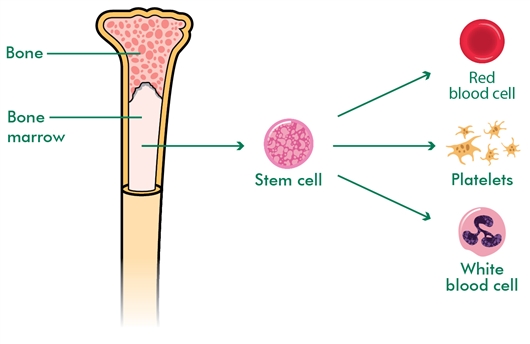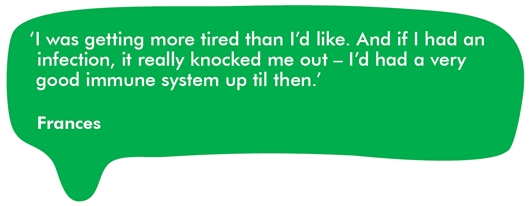This week is Myeloma Awareness Week. In this blog, written by our editor Sadie, we will tell you what myeloma is, its symptoms and possible risk factors. We’ll also let you know where you can get further information and support.
Myeloma, also known as multiple myeloma, is not a common cancer. Around 4,800 people are diagnosed with it each year in the UK. It is slightly more common in men than in women, and is most often diagnosed in people over the age of 65.
What is myeloma?
Myeloma is a cancer of the bone marrow. Bone marrow is a spongy substance in our bones. It is part of our immune system, which protects us from disease and infections. Bone marrow produces stem cells (immature cells) that develop into:

Bone marrow producing stem cells
Myeloma affects a type of white blood cell called plasma cells. Normally, new plasma cells replace old ones in a controlled way. But in people who have myeloma, this process is out of control and large numbers of abnormal plasma cells (myeloma cells) are produced. These can spread through the bone marrow to different parts of the body. This is why myeloma is sometimes called multiple myeloma.
These myeloma cells fill up the bone marrow and interfere with the production of normal blood cells. They can also cause bone damage.
What are the risk factors for myeloma?
Doctors don’t know what causes myeloma, but there are some things that can increase the risk of developing it (risk factors):
What are the symptoms of myeloma?
Myeloma may not cause symptoms in its early stages. It may be diagnosed after a routine blood test. But sometimes people with myeloma are admitted to hospital with severe symptoms, caused by:
Other symptoms can include poor appetite and changes in bowel habits.
Symptom control is important for everyone diagnosed with myeloma. We have more information about this.

In this video, a haematology doctor discusses myeloma and how it is treated:
Where can I get further information and support?
If you’ve been diagnosed with myeloma, our cancer support specialists can help – you can speak to them by calling 0808 808 00 00. Macmillan can offer a range of emotional, practical and financial support.
In the video below, Patsy, diagnosed with myeloma in 2004, talks about the support she received from Macmillan.
We have a booklet called Understanding myeloma. It has more information about myeloma, how it is diagnosed, treatments and living with the condition.
We also have information about myeloma on our website.
Finally, there are other organisations that can offer information and support to people affected by myeloma. These include:
To see what else Macmillan's cancer information team has been blogging about, please visit our blog home page! You can subscribe to receive our blogs by email or RSS too.
We're with you every step of the way
The Macmillan team is here to help. Our cancer support specialists can answer your questions, offer support, or simply listen if you need a chat. Call us free on 0808 808 00 00.
Comments? Feel free to add them below (you need to be logged in).
Keep in touch Follow Macmillan’s cancer information team on Twitter @mac_cancerinfo
Whatever cancer throws your way, we’re right there with you.
We’re here to provide physical, financial and emotional support.
© Macmillan Cancer Support 2024 © Macmillan Cancer Support, registered charity in England and Wales (261017), Scotland (SC039907) and the Isle of Man (604). Also operating in Northern Ireland. A company limited by guarantee, registered in England and Wales company number 2400969. Isle of Man company number 4694F. Registered office: 3rd Floor, Bronze Building, The Forge, 105 Sumner Street, London, SE1 9HZ. VAT no: 668265007